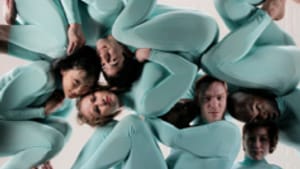Stay in the Loop
BSR publishes on a weekly schedule, with an email newsletter every Wednesday and Thursday morning. There’s no paywall, and subscribing is always free.
Goofy fun, or a fungus among us?
Pilobolus Dance Theater at Annenberg (1st review)

Pilobolus is a performance paradox. After 41 years, this company continues to offer visual dazzle and antic play, propelled by the athletic prowess of its primarily male corps.
At Annenberg, where the company repeatedly returns, audiences fill the seats and cheer the group like baseball fans rooting for the hometown team. Yet more often than one might wish, Pilobolus programs convey a one-joke tediousness— a lack of imagination or overwrought sentimentality in their work that leaves me disengaged.
This month Pilobolus presented four Philadelphia premieres created in the last two years that involved the artistic collaborations they have turned to as a way of breathing new life into their repertory. But these collaborations inevitably become Pilobolized, as if the fungus for which the group is named grows so densely as to overwhelm the outside artists' contributions.
Tepid juggling
Azimuth (2012) had the potential for keying in to the Pilobolus strengths of image making and gymnastic finesse, since the collaborator was the acclaimed theater artist and juggler (and MacArthur Award winner) Michael Moschen. Colored balls, initially hung as celestial orbs, later became the subject of juggling play among dancers, and a large silver hoop and smaller semi-circular silver rods offered up images of whirling slicing machines and curved metallic spines in motion.
But I soon lost interest in the silvery props, and the juggling itself was tepid. The magic and wonderment weren't there.
Eye-catching video
In Skyscrapers (2012), another recent collaboration with the choreographer and music team of Trish Sie and the band OK Go (a YouTube favorite), the artist team makes a stage adaptation of Sie's four-minute music video of the same name, which has attracted almost 2 million viewers. (To see it, click here.)
In this eye-catching and fast-cutting video, Sie and Moti Buchboot tango through multiple costume changes and horizontally across a backdrop of fast-changing, colorful Los Angeles street scenes. The Pilobolus dancers race their tango-esque dance sequences of the song with six performers, who make 32 costume changes— some to the "ahs" of the audience, as when they quickly reverse or instantly shed a costume onstage.
The company adds its stamp of humor and speedy agility to this original video work while retaining its visual impact of vivid hues. But the dance video's nuanced and sultry romance is missing from this more slapstick stage version.
Dancers as robots
The OK Go, Sie and Pilobolus team also created All Is Not Lost (2011), in which dancers clad in baby blue frolic on a raised horizontal clear Plexiglas sheet, where their carousing is captured by a camera looking up at them from below, with the image projected on a large screen for the audience. Its all goofy and simple, playful fun. Very Pilobolus.
The last of the newer works also demonstrated great potential as the company created Automaton (2012) with the outstanding Flemish-Moroccan choreographer, Sidi Larbi Cherkaoui, whose own work and company needs to be seen at Annenberg. (Philadelphia's Live Arts Festival has brought Cherkaoui to Philadelphia, and European stages like Sadler's Wells in London have presented his epic trilogy.)
Here dancers with white gloves move mechanically as robots, who soon adjust three large, upright mirrors to hide and reflect dancers' images— their own and others. But then their movement loses its machine-like gestures, and we're left a bit confused and cold.
Serious side
Perhaps instead of ending the evening with Automaton, Pilobolus should have chosen its earlier classic, Gnomen (1997), which closed this month's first half. This piece may represent the best of Pilobolus's serious side.
The dance, dedicated to the memory of a past Pilobolus dancer, Jim Blanc, exudes an elegiac quality as four bare-chested men move in a languid, melancholic manner. Men lifting a body horizontally, high above their heads, or setting an inverted body with the head nesting and balanced upside down upon a shoulder and neck. The movement has the feel of a tender, caring ritual that may not need the soupy, over-dramatic music of the piece's close.
This is my preferred Pilobolus— a group that understands that less is more.♦
To read another review by Steve Cohen, click here.
At Annenberg, where the company repeatedly returns, audiences fill the seats and cheer the group like baseball fans rooting for the hometown team. Yet more often than one might wish, Pilobolus programs convey a one-joke tediousness— a lack of imagination or overwrought sentimentality in their work that leaves me disengaged.
This month Pilobolus presented four Philadelphia premieres created in the last two years that involved the artistic collaborations they have turned to as a way of breathing new life into their repertory. But these collaborations inevitably become Pilobolized, as if the fungus for which the group is named grows so densely as to overwhelm the outside artists' contributions.
Tepid juggling
Azimuth (2012) had the potential for keying in to the Pilobolus strengths of image making and gymnastic finesse, since the collaborator was the acclaimed theater artist and juggler (and MacArthur Award winner) Michael Moschen. Colored balls, initially hung as celestial orbs, later became the subject of juggling play among dancers, and a large silver hoop and smaller semi-circular silver rods offered up images of whirling slicing machines and curved metallic spines in motion.
But I soon lost interest in the silvery props, and the juggling itself was tepid. The magic and wonderment weren't there.
Eye-catching video
In Skyscrapers (2012), another recent collaboration with the choreographer and music team of Trish Sie and the band OK Go (a YouTube favorite), the artist team makes a stage adaptation of Sie's four-minute music video of the same name, which has attracted almost 2 million viewers. (To see it, click here.)
In this eye-catching and fast-cutting video, Sie and Moti Buchboot tango through multiple costume changes and horizontally across a backdrop of fast-changing, colorful Los Angeles street scenes. The Pilobolus dancers race their tango-esque dance sequences of the song with six performers, who make 32 costume changes— some to the "ahs" of the audience, as when they quickly reverse or instantly shed a costume onstage.
The company adds its stamp of humor and speedy agility to this original video work while retaining its visual impact of vivid hues. But the dance video's nuanced and sultry romance is missing from this more slapstick stage version.
Dancers as robots
The OK Go, Sie and Pilobolus team also created All Is Not Lost (2011), in which dancers clad in baby blue frolic on a raised horizontal clear Plexiglas sheet, where their carousing is captured by a camera looking up at them from below, with the image projected on a large screen for the audience. Its all goofy and simple, playful fun. Very Pilobolus.
The last of the newer works also demonstrated great potential as the company created Automaton (2012) with the outstanding Flemish-Moroccan choreographer, Sidi Larbi Cherkaoui, whose own work and company needs to be seen at Annenberg. (Philadelphia's Live Arts Festival has brought Cherkaoui to Philadelphia, and European stages like Sadler's Wells in London have presented his epic trilogy.)
Here dancers with white gloves move mechanically as robots, who soon adjust three large, upright mirrors to hide and reflect dancers' images— their own and others. But then their movement loses its machine-like gestures, and we're left a bit confused and cold.
Serious side
Perhaps instead of ending the evening with Automaton, Pilobolus should have chosen its earlier classic, Gnomen (1997), which closed this month's first half. This piece may represent the best of Pilobolus's serious side.
The dance, dedicated to the memory of a past Pilobolus dancer, Jim Blanc, exudes an elegiac quality as four bare-chested men move in a languid, melancholic manner. Men lifting a body horizontally, high above their heads, or setting an inverted body with the head nesting and balanced upside down upon a shoulder and neck. The movement has the feel of a tender, caring ritual that may not need the soupy, over-dramatic music of the piece's close.
This is my preferred Pilobolus— a group that understands that less is more.♦
To read another review by Steve Cohen, click here.
What, When, Where
Pilobolus Dance Theater. January 17-20, 2013 at Annenberg Center, 3680 Walnut St. (215) 898-3900 or www.annenbergcenter.org.
Sign up for our newsletter
All of the week's new articles, all in one place. Sign up for the free weekly BSR newsletters, and don't miss a conversation.

 Jonathan M. Stein
Jonathan M. Stein